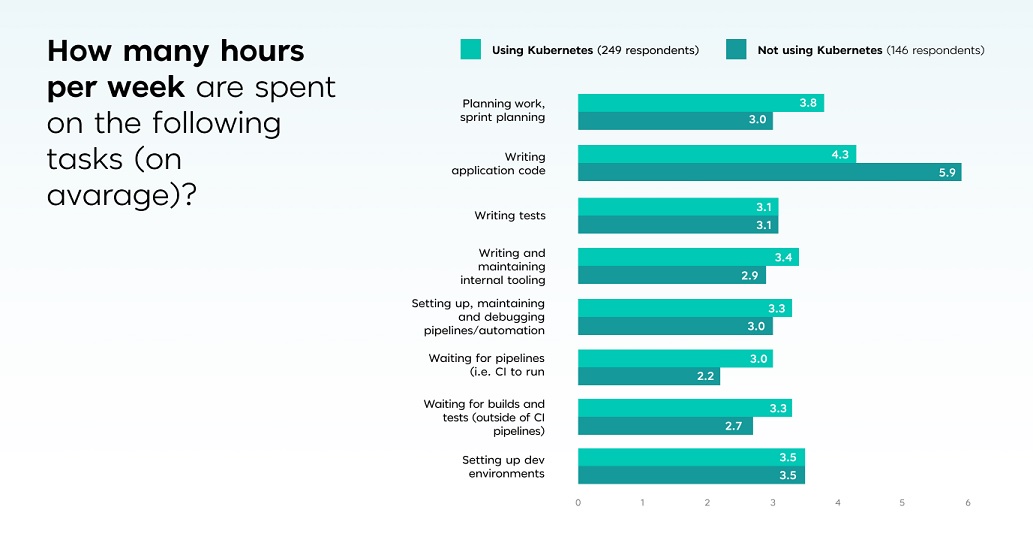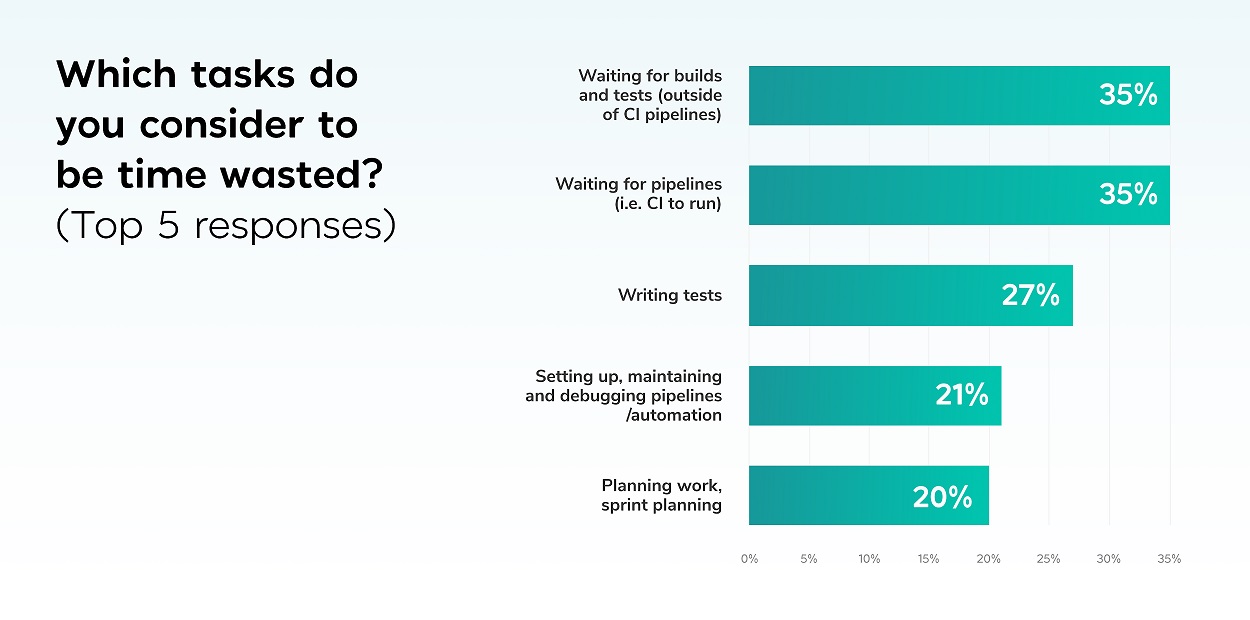Google unveiled a significant wave of advancements designed to supercharge how developers build and scale AI applications – from early-stage experimentation right through to large-scale deployment.
Working with microservices and Kubernetes often means solving the same solved problems over and over, without having the time to focus on what really brings value to the business. Instead of shipping new features, hours are spent wrangling dev environments, or waiting to get feedback from slow tests, or troubleshooting CI. It can be really frustrating. And it's a common complaint I hear from other developers and DevOps engineers.
Garden recently commissioned research to gather insights from software professionals around the world, and specifically to find out where time is being spent, what tasks often cause frustration, and how this time could be better spent. Vanson Bourne surveyed 400 developers and DevOps team members of varied levels in the US, UK, and Germany, from January-February 2021.
Some of what we learned reinforced my own experiences but there were some other surprising insights. And when we set out to quantify the impact of time spent on "solved problems" that respondents shared with us, the data was truly eye popping.
Time is (a lot of) Money!
Respondents spend, on average, more than 15 hours every week on tasks outside of writing application code — from maintaining internal tooling, to setting up dev environments, to debugging pipelines, to waiting for builds and test results.
Breaking this down, those working for organizations already using Kubernetes spent 16.5 hours a week vs. 14.3 hours for those working at organizations that are not yet using Kubernetes.
This is in stark contrast to the 4.5 hours spent by developers actually writing code. Let that sink in for a bit.
In the US alone, we calculated this time spent could be costing companies up to $61 billion per year, based on median pay and number of software developer jobs in 2019, as reported by the US Bureau of Labor Statistics(link is external).
DevOps Nirvana is Still Elusive
Despite the promise of DevOps to enable greater focus and productivity for organizations, respondents at all levels and across departments are spending more than a working day and a half every week on work outside of writing code.

Top Three Frustrations
We asked respondents to rank the top 3 things that cause them the most frustration at their job.
55% of respondents identified difficult communication between teams and functional groups, closely followed by 54% with slow feedback loops during the development process. Lack of flexibility in choosing tools came in third at 49%.
"Slow feedback loops during the development process" was the frustration that was most frequently ranked #1, with 20% of respondents ranking it as their top frustration. It makes sense, considering the sheer number of hours respondents spend setting up and waiting for pipelines, waiting for builds and tests, and setting up development environments.
Top Time-Wasting Tasks (That Could Likely Cause an Organization to Be Less Competitive)
A clear majority of respondents acknowledge they're not spending their time as effectively as they could. In fact, more than 75% of respondents say the time they spend on specific tasks is time wasted, suggesting it could be put to more strategic use.

Seven in 10 respondents say the time they spend on specific tasks is time wasted, and they would rather spend time on tasks that directly support the company's bottom line:
■ 49% of these respondents say they would develop new products and services to support the company
■ 46% say they would improve speed and delivery of existing products and services
■ 44% say they would improve security for existing products and services
And this doesn't even take into consideration the opportunity cost of keeping developers from higher-value work. Imagine the potential if every software developer could reclaim an extra day every week.
Funding the Future of DevOps
It's clear we still have a long way to go before we reach DevOps nirvana, that magical place where developers no longer waste hours every week on low-value work and development workflows are free of frustration.
The good news is that a majority of respondent organizations plan to budget more toward DevOps and tooling and increase headcount in 2021 compared to 2020. And organizations that are using Kubernetes are substantially more likely to be increasing budgets (79% vs. 69%) and growing their teams (86% vs. 77%). It is reassuring that company leaders around the world are aware of the need to keep pace with their tooling and talent as their application architecture changes.
Industry News
Red Hat announced Red Hat Advanced Developer Suite, a new addition to Red Hat OpenShift, the hybrid cloud application platform powered by Kubernetes, designed to improve developer productivity and application security with enhancements to speed the adoption of Red Hat AI technologies.
Perforce Software announced Perforce Intelligence, a blueprint to embed AI across its product lines and connect its AI with platforms and tools across the DevOps lifecycle.
CloudBees announced CloudBees Unify, a strategic leap forward in how enterprises manage software delivery at scale, shifting from offering standalone DevOps tools to delivering a comprehensive, modular solution for today’s most complex, hybrid software environments.
Azul and JetBrains announced a strategic technical collaboration to enhance the runtime performance and scalability of web and server-side Kotlin applications.
Docker, Inc.® announced Docker Hardened Images (DHI), a curated catalog of security-hardened, enterprise-grade container images designed to meet today’s toughest software supply chain challenges.
GitHub announced that GitHub Copilot now includes an asynchronous coding agent, embedded directly in GitHub and accessible from VS Code—creating a powerful Agentic DevOps loop across coding environments.
Red Hat announced its integration with the newly announced NVIDIA Enterprise AI Factory validated design, helping to power a new wave of agentic AI innovation.
JFrog announced the integration of its foundational DevSecOps tools with the NVIDIA Enterprise AI Factory validated design.
GitLab announced the launch of GitLab 18, including AI capabilities natively integrated into the platform and major new innovations across core DevOps, and security and compliance workflows that are available now, with further enhancements planned throughout the year.
Perforce Software is partnering with Siemens Digital Industries Software to transform how smart, connected products are designed and developed.
Reply launched Silicon Shoring, a new software delivery model powered by Artificial Intelligence.
CIQ announced the tech preview launch of Rocky Linux from CIQ for AI (RLC-AI), an operating system engineered and optimized for artificial intelligence workloads.
The Linux Foundation, the nonprofit organization enabling mass innovation through open source, announced the launch of the Cybersecurity Skills Framework, a global reference guide that helps organizations identify and address critical cybersecurity competencies across a broad range of IT job families; extending beyond cybersecurity specialists.
CodeRabbit is now available on the Visual Studio Code editor.
The integration brings CodeRabbit’s AI code reviews directly into Cursor, Windsurf, and VS Code at the earliest stages of software development—inside the code editor itself—at no cost to the developers.




